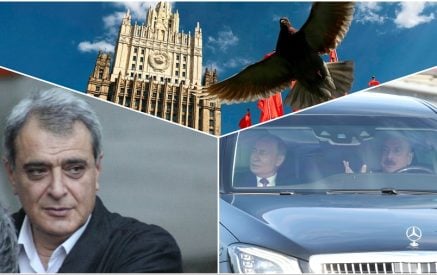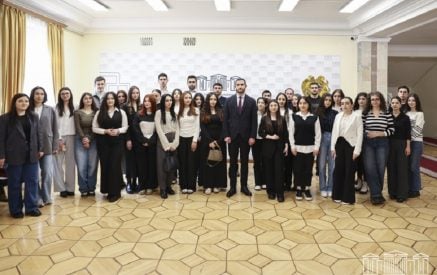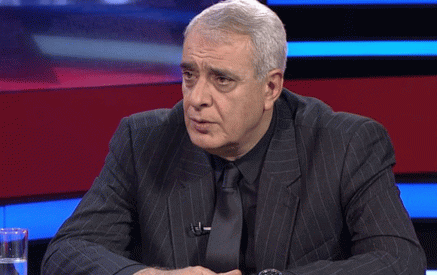“Not everything starts and ends with the state channels, the youth are more flexible and may suggest alternative solutions”
The Civic Consent NGO jointly with the British Embassy in Yerevan launched a program in Yerevan devoted to “Normalization of Relations between Armenia and Turkey: Challenges and Perspectives” funded by Foreign and Commonwealth Office. This program kicked off in Tsakhkadzor on September 24-25. Around 40 active and experienced young representatives from political parties and CSOs interested in normalization of relations between Armenia and Turkey and establishment of security and stability in the region were selected to take part in the program.
According to Gegham Sargsyan, Political and Civic Consultant of NDI’s Programs in Armenia, the program envisages establishing ties with Turkish counterparts, Istanbul University, students and representatives of NGOs. “The domestic situation in Turkey has changed. There are concerns that some people there would consider it inappropriate to take part in this kind of a program,” added Gehgam Sargsyan.
To the question on what is the main goal and anticipated outcomes of the discussions, Gegham Sargsyan replied, “We will work on raising the awareness of societies in both countries, will try to make this program public through media publications, online communication, Skype calls, mutual visits to Turkey and Armenia in order to understand the public sentiments. There is no any study or in-debt research carried out so far to find out which part of the society is interested in normalization of relations with Turkey, except the unsuccessful attempt carried out through the state channels. The latter resulted in the elaboration of Armenia-Turkey protocols which failed. The other aspect is that future decision-makers, representatives of political parties are present here. In future they will be the ones to make decisions and to implement them. The youth is more flexible and may suggest alternative solutions which may bring to considerable results in public diplomacy and communications. Young people often come up with outstanding solutions on the possible ways of normalization of Armenia-Turkey to move the things forward. We must also pay attention to our Turkish counterparts and their visions on normalization of Armenia-Turkey relations.”
Read also
As Gegham Sargsyan mentioned, the ideas that will be elaborated during the discussions stipulated by the program, will possibly grap more attention of state channels, NGOs and political parties if put into circulation. “I wish the political parties developed their foreign policy agenda and incorporated the normalization of relations between Turkey and Armenia in their platforms prior to the parliamentary elections. Some of the political parties are more tolerant and liberal when addressing this issue, but there are parties with tough positions in regards to the relations between Armenia and Turkey. They have some preconditions. However it’s a process of coalition building here,” said Gegham Sargsyan. According to him, “Not everything starts and ends with state channels. I think if such attempts are carried out more often, there will be some sensitive results over time. It is possible to speed up the process of normalization of relations between the two states through dialogue between two societies and the open-minded youth.” By the way, it’s notable that the Republican party of Armenia, which also got an invitation, found it inappropriate to take part in this program unlike the other parliamentary parties of Armenia.
Just from the beginning it was noted that the training will not address the reconciliation process, since that process has nothing in common with the establishment of relations between the two states. The program will only address the second-track diplomacy, that is the public diplomacy through which it will be possible to reach compromise and to come to consensus. The audience will try to find similarities and will not concentrate on subtle issues.
During the training a bunch of questions was covered. For example, how to move forward, what kind of alternative solutions and concept papers should be developed in order to highlight similarities and temporarily put aside more complex problems, what will be the geopolitical implications of opening the Turkish-Armenian border and establishing diplomatic relations, how to ensure dialogue between two societies, how to raise awareness in both societies, what are the main obstacles Armenia faces in establishing relations with Turkey, what is the general situation in the South Caucasus region, what are the relations between Turkey and its neighbors, what are the possible prospects and challenges. It was highlighted that under the tenure of Recep Tayyip Erdoğan Turkey has changed a lot. Besides, the domestic situation there has been also changed in July, after the attempt of the coup d’état in Turkey.
David Shahnazaryan, senior analyst at Regional Studies Center (RSC), former Minister of National Security of Armenia and former Ambassador of the President of Armenia on Special Missions, first spoke about what had been changed in Turkey in the last 10-15 years, how Kemal Ataturk created a secular Turkey, and secularism was guaranteed by the Constitution of the country, which excluded the Islamism. In other words, when secularism was endangered, the army had the right to organize a military coup in the country.
“Before Erdogan’s tenure the priorities of Turkey’s foreign policy were relations with the US, Israel and the EU. Those relations are not priorities for Turkey for this moment,” said Shahnazaryan, drawing attention to the fact that sometimes the relations with the United States, EU and NATO are intensified, while during the 9-month tension in Russia-Turkey relations, these two countries did not have any problems in regards to ensuring joint security of the Black sea. It is not a secret that these two countries have been closely cooperating on the Black Sea issue within the last 13-14 years, though Turkey still has some contradictions with Russia. To the question on what kind of Turkey is beneficial for Armenia, Shahnazaryan said that Armenia needs stable and predictable Turkey. As to which are current priorities of Turkish foreign policy, Shahnazaryan noted that so far, Turkey’s foreign policy priorities are not distinct.
David Shahnazaryan spoke about the differences of Armenian-Turkish and Armenia-Turkey relations. In the first case we speak about reconciliation, where the Diaspora has a lot to do. From the other hand, “The establishment of relations between Armenia and Turkey is a matter of our state and our citizens. Solely the citizens of the Republic of Armenia should deal with the interstate relations. I do think that there is no any sense to speak about reconciliation unless any progress is recorded in the interstate relations of Armenia and Turkey,” said Shahnazaryan.
According to the participants of the training, Turkish former Foreign Minister Ahmet Davutoğlu’s “zero problems with neighbors” thesis failed and transformed into “zero neighbors” reality. However Hayk Gabrielyan, an expert on Turkey, did not agree with this opinion. “In 2009, when Ahmet Davutoğlu became Foreign Minister of Turkey, he engaged the country in active diplomatic relations with neighbors. He strengthened the relations with Bulgaria, Greece, to some extent with Cyprus, Iran, and Syria. Some attempts to establish relations with Armenia were also initiated. American “Foreign Policy” therefore not by chance declared Davutoğlu as one of the best diplomats ever and called him “new Kissinger”. It is immensely important to understand, that Turkey’s “zero problems with neighbors” policy came to an end at this very time. The exact borderlines should be marked here,” he said.
According to Hayk Gabrielyan, due to Davutoğlu Turkey got an opportunity to maneuver in its foreign policy, immediately switched to neoosmanism and worsened relations with some of its neighbor states. The latter blamed Turkey for interfering in their internal matters. Recently Turkey has again switched to “zero problems with neighbors” policy. “This transformation is temporary. Turkey changes its policy for getting the opportunity to maneuver again. That means that the policy of “zero problems with neighbors” will always be followed by neoosmanism and vice versa,” added Hayk Gabrielyan.
The attempt of the military coup that took place in Turkey in July became a serious indicator for Turkey’s foreign policy. Currently in their politics Turkish authorities are guided by this indicator and always consider which country provided assistance to Turkish government on the days of the military coup. Gabrielyan mentioned that nowadays Erdogan has 20-25 million of votes. Even the oppositional party, which has been formed by Ataturk and is currently headed by Kemal Kılıçdaroğlu, did not support the attempt of the military coup; the party supported the large-scale referendum for democracy and against military revolutions conducted in Istanbul and initiated by Turkish authorities.
What refers to relations with Armenia, Gabrielyan spoke about the statements of Turkish Prime-Minister Binali Yıldırım. According to those statements, Turkey should work on establishing close ties with other states and should decrease the number of allies. He also noted the recent publications in Turkish media. According to the latter the Turkish authorities met the authorities of Azerbaijan in Baku and discussed the matter of normalization of relations with Armenia. Later the Foreign Minister of Turkey Mevlüt Çavuşoğlu confirmed this information. “Azerbaijan’s position is the main obstacle that prevents the opening of the Armenian-Turkish border. Turkey does not want to risk its relations with Azerbaijan, since those relations are much more beneficial for Turkey in many terms. For instance, Azerbaijan remains the third largest supplier of Turkish gas. Turkey receives the cheapest gas from Azerbaijan”, said the speaker and expressed his opinion that in 2-3 years Azerbaijan will turn into the second largest gas supplier of Turkey bypassing Iran (the construction of TANAP). Hayk Gabrielyan also mentioned that Azerbaijan initiates large-scale investment activities in Turkey. Azerbaijani state oil company SOGAR promised to make an investment of 17 billion dollars in Turkey. They promised that those investments would reach 50 billion dollars. “The financial difficulties that Azerbaijan faces nowadays, the reducing dependence of Turkey from Azerbaijani investments may positively impact on the opening of borders between Turkey and Armenia,” said the trainer.
The audience was eager to know what is more important in the interstate relations of Armenia and Turkey: the establishment of diplomatic relations or the opening of the border. All of the attendants came to conclusion that opening of the border does not necessarily refer to the establishment of diplomatic relations. And vice versa, the establishment of diplomatic relations does not directly result in the opening of the border. Numerous topics were discussed during the session related to what economic benefits Armenia will get in case the border is opened; wheather Turkey is interested in the social-economic development of its eastern Kurdish regions, etc. Those questions created a space for further discussions and debates.
EMMA GABRIELYAN
“Aravot” daily 28.09.2016






































































